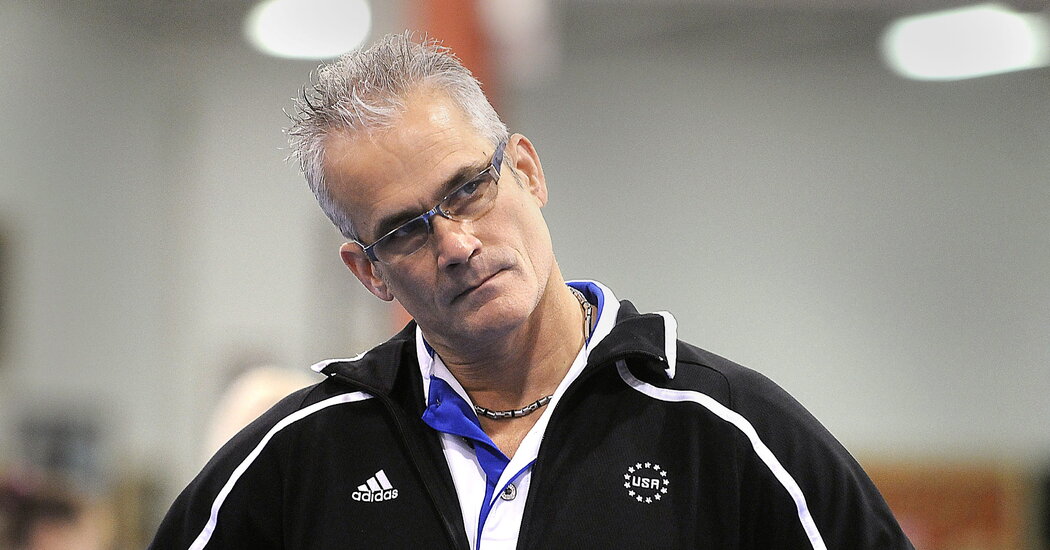For several decades, until law enforcement finally came calling and their careers came to an end, the coach and the doctor were close friends who made a perfect team of abusers.
John Geddert, a coach of the 2012 Olympic women’s gymnastics team, and Lawrence G. Nassar, the longtime national team doctor, were so close that Geddert had been in Nassar’s wedding party.
The two relied on each other to fuel a cycle of abuse that occurred at Geddert’s gym in Michigan, several of Geddert’s former gymnasts and their parents said on Friday.
“You had this good cop, bad cop dynamic that worked beautifully,” said Sarah Klein, 41, who has said she was abused by both men. “John would beat us up and break us down both mentally and physically and then send us back to Larry, who would give us a tissue to dry our tears and sexually abuse us. Then he’d send us back to John, often on broken bones and pulled muscles, so the cycle could start all over again.”
Klein was one of many women trying to process what happened on Thursday, when Geddert, 63, killed himself after he was charged with human trafficking, including forced labor, and sexually assaulting a teenage girl. Human trafficking refers not only to sexual exploitation but also to coerced labor of any kind.
Geddert’s body was found at a roadside rest area in Clinton County, Mich., the State Police said in a statement on Twitter. He had not reported for an arraignment earlier in the day.
It was a traumatic day for Klein and the two men’s other victims, but the charges were something she had long been waiting for. Nassar, who began abusing Klein when she was 8, could not have continued perpetrating his crimes if it hadn’t been for coaches like Geddert and other adults and sports organizations enabling him, she said. Nassar’s relationship with Geddert continues to be a searing example of the many ways the entire sport has failed to protect its young athletes.
“When Nassar was convicted, it was Part 1,” Klein, a lawyer in Philadelphia said on Friday. “And we’ve been waiting all these years for Part 2.”
And waiting. And waiting.
Geddert had been implicated in the investigation that culminated in Nassar’s being sentenced in early 2018 to what amounts to life in prison. Right away, U.S.A. Gymnastics suspended Geddert’s membership, and he retired as a coach and transferred ownership of his gym, Twistars in Dimondale, Mich., to his wife, Kathryn.
Yet months and months went by as gymnasts who said they were abused by Geddert waited for him to be held accountable.
Geddert — a slim former college gymnast with sharply cut facial features — had been in the sport for more than 30 years, and gymnasts tell stories of his abuse that go back to the 1980s.
That was when Geddert worked at Great Lakes Gymnastics in Lansing, Mich., where Klein trained with him. She said that he would often talk about gymnasts’ bodies, especially when their breasts began to develop, and that Geddert would say that he liked the shape of her rear end.
“I equate him to a mob boss who did anything he wanted and would stop at nothing to achieve what he wanted to achieve,” said Klein, who said she later thought about suicide because of the abuse. “Whether that was a gold medal, or making someone cry or quit the sport. Sometimes it felt like he was driving his gymnasts to a mental breakdown for no reason.”
In Abigail Pesta’s 2019 book, “The Girls,” the gymnast Sara Teristi describes a tense atmosphere at the gym ruled by Geddert, who was demanding and had a harsh temper. He would call the girls worthless and would grow angry quickly, sometimes throwing clipboards at them, Teristi said. Once, he purposely failed to help her with a flip and she fell on her head, she said.
Other forms of cruelty were common.
“He said the boys would love me because I couldn’t keep my legs together” during routines, Teristi said of Geddert in the book. “I was just 10 years old, but I know what he meant.”
Early on, Geddert found another adult to joke around with: a young Larry Nassar, who was a student of osteopathy at Michigan State at the time. Nassar volunteered his services as an athletic trainer to gymnasts, and he later set up an office in the back of the gym, where gymnasts could find him for 20 hours a week or more.
Teristi was 14 when Nassar started molesting her, she said. She recalled injuring her chest during practice and that Nassar would ice it, but eventually began touching her breasts as well. On one occasion, she said, Geddert was in the room and saw Nassar touching her nipples, then began joking with Nassar about the size of Teristi’s breasts.
The methods many top coaches like Geddert have used to make their athletes successful included humiliating them, scaring them into submission and punishing them with demands for extra training or by withholding water. Weight-shaming was part of the daily routine: Geddert, for example, once made his athletes write an apology letter to him for eating frozen yogurt, a food he did not approve of.
If gymnasts or parents complained about his behavior, the gymnasts would face even harsher abuse the next day. When Geddert opened his own gym, Twistars, with his wife in 1996, parents learned quickly to tread lightly around him or jeopardize their daughters’ chances at a college scholarship — or the Olympics.
Kris Day — whose daughter, Autumn Blaney, trained with Geddert and said she was abused by him and Nassar — recalled on Friday that she felt compelled to ask Geddert’s permission to take her family on trips, even to visit her parents on a weekend, because Geddert demanded that gymnasts attend every practice.
“Honestly, John was terrifying, intense in the gym and arrogant, and he scared parents, girls and coaches, everyone,” Day said. “But when you’re living it, you think these are amazing coaches and what a blessing it is to be a part of this.”
Other parents, including Rita Wieber — the mother of Jordyn Wieber, a 2012 Olympic gold medalist and the 2011 world champion in the all-around competition — described the environment as cultlike, with Geddert luring people in with his personality, then keeping everyone in fear of him.
“Cult leaders get their people to want to please them and create this power over them, and I feel like that’s what John did at the gym,” Rita Wieber said. “He made people want to feel validated by him, and their children wanted his approval. He convinced you that he had the power to make or break your child’s career.”
Wieber said that parents felt special when Geddert invited them to parties or to his Friday night karaoke get-togethers, and that no one in the inner circle would dare to ruin that relationship by complaining about his emotional and physical abuse of the athletes. Even when that abuse was obvious, and even when some families and coaches went to law enforcement about it.
In 2011 and 2013, the police questioned Geddert about assault and battery accusations. The first instance involved an accusation of assault in the parking lot of his gym. A woman said Geddert had stepped on her foot and chest-bumped her in an effort to keep her from walking away. In 2013, a young gymnast accused Geddert of stepping on her foot and grabbing her arm. Both times, prosecutors declined to press charges.
“There were constant things going on with John’s behavior,” Wieber said. “I would complain, other parents would complain, gymnasts would complain. But everything was always dropped.”
Geddert continued to throw cups at gymnasts and scream at them from such close range that they could feel his spit hitting their faces, several of his former gymnasts said, and he would often walk into the girls’ bathroom without announcing himself. At a meet in Las Vegas, he made a group of gymnasts take their second-place trophies on a sightseeing trip, to shame them for not winning, Wieber said.
Wieber said she complained to two people at U.S.A. Gymnastics about Geddert, seeking help or advice on how to handle him. One was Steve Penny, then the president of the federation, who later was found to have covered up Nassar’s abuse.
The other was Larry Nassar.
“He would always empathize with me, but then he would defend him, too, and say John was working on his behavior,” Wieber said.
She didn’t learn until years later that Nassar had abused her daughter, Jordyn.
“They were buds and protected each other,” Rita Wieber said. “At that point, I didn’t know Larry was a psychopath, too.”
There is no sense of closure for the victims of either Nassar or Geddert, said Klein, who is demanding an independent investigation into who knew what, and when, at U.S.A. Gymnastics and the United States Olympic & Paralympic Committee.
There is no way she will let the story conclude this way, Klein said, with Geddert ending his life at a rest stop off the interstate.
“It was the ultimate act of defiance,” she said. “John Geddert ran John Geddert’s world, and in that world he never let anyone have the upper hand. He exerted power and control until his very last breath.”
Alain Delaquérière contributed research.
Source: Read Full Article






